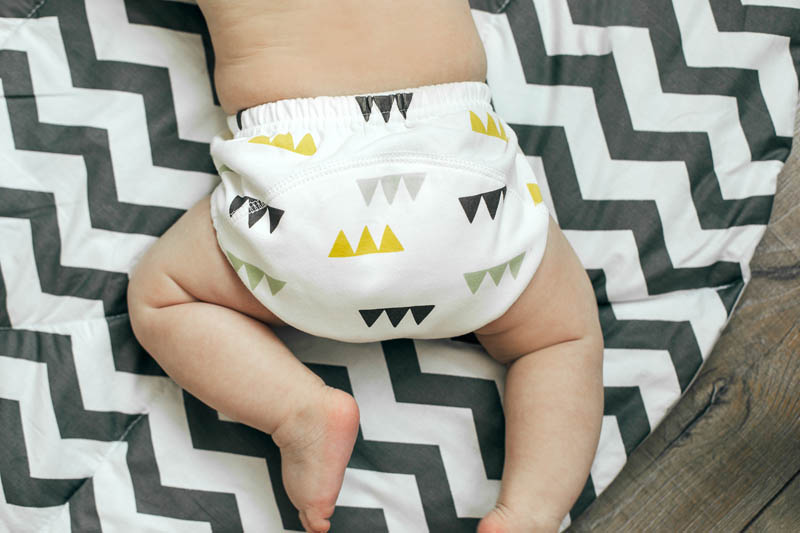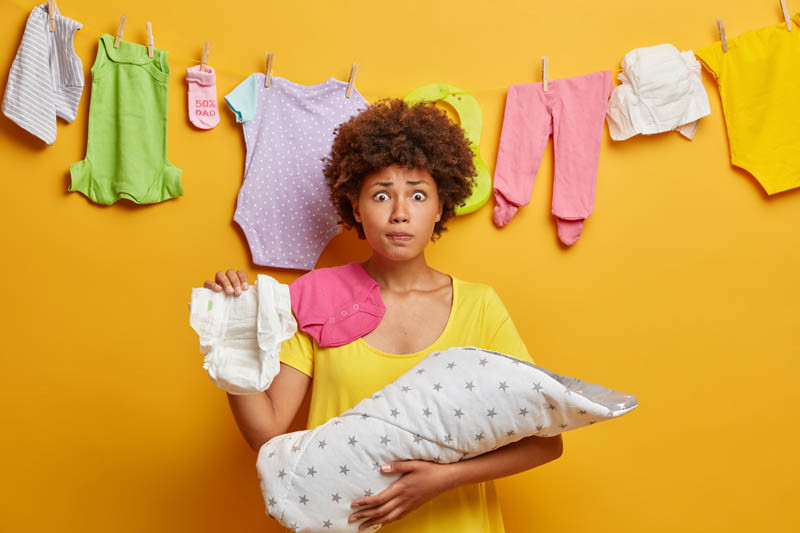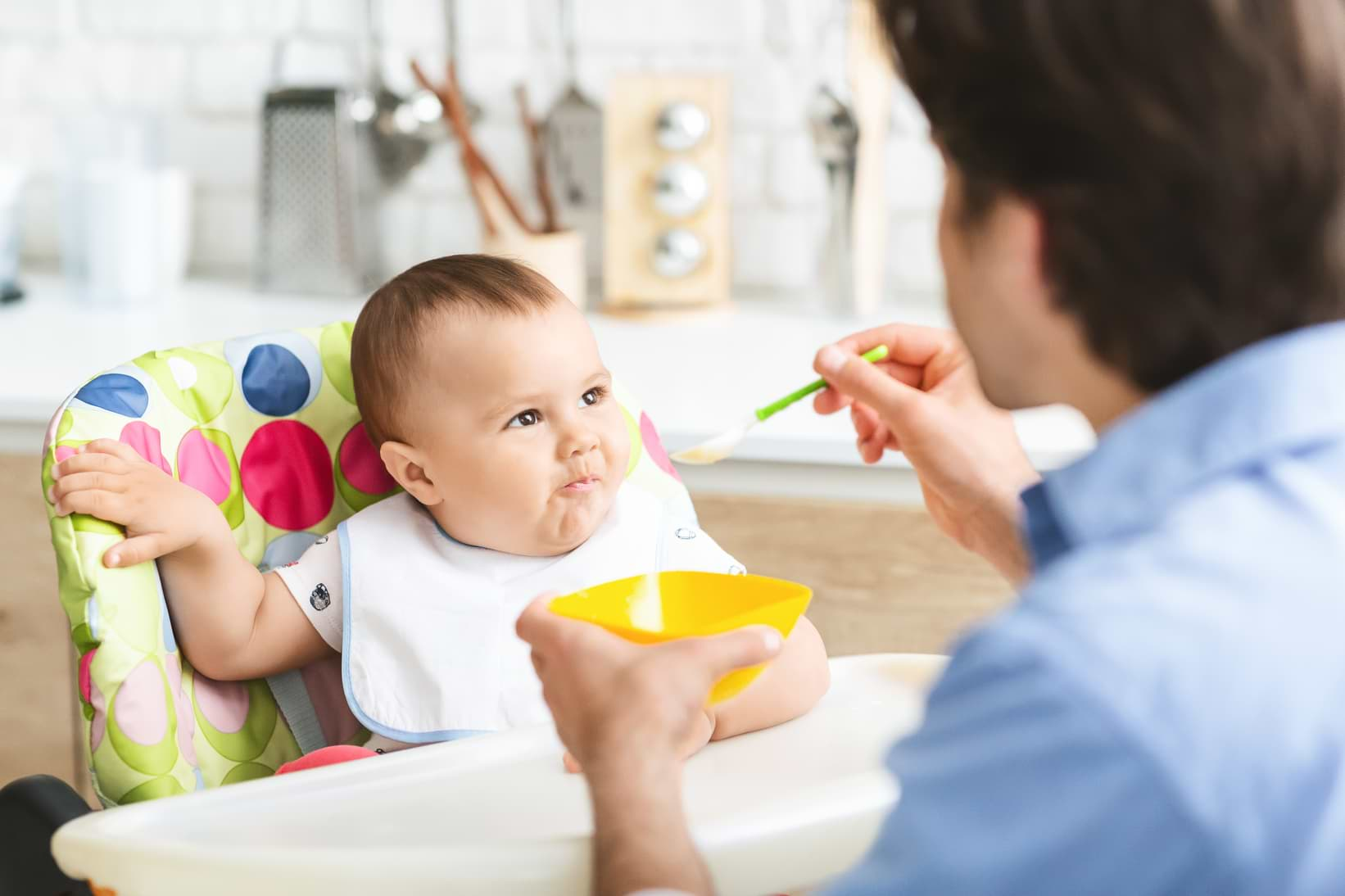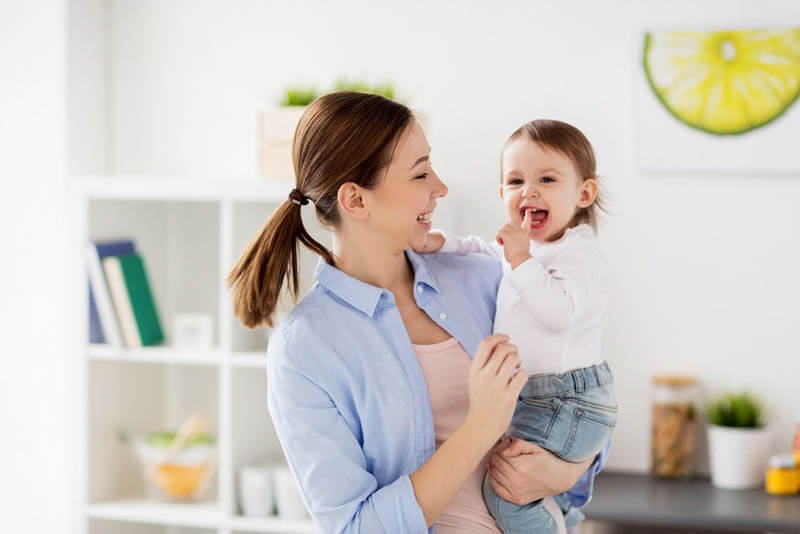Should I share a bed with my infant? At what age is co-sleeping safe? Is co-sleeping good or bad? When to stop co-sleeping? This topic is so controversial, and there are many opinions of parents and healthcare providers. Some are totally against it, some are willing to give it a try. But the truth is somewhere in the middle.

The AAP (American Academy of Pediatrics) claims parents mustn’t sleep in the same bed together with their children, and it also concerns co-sleeping with newborn on chest, because there is a high risk of SIDS (sudden infant death syndrome), suffocation, and other sleep-related accidents. Also, this can affect older children in a negative way making them develop a sleep crutch.
Nevertheless, many parents still think co-sleeping is a good idea as it helps kids feel safe, promotes bonding, and makes it easy for a mom to nurse her baby during the night. Let’s see co-sleeping pros and cons.
Benefits of Co-Sleeping with an Infant
#1. Your Baby Feels Safe.
As little children start showing the signs of separation anxiety when they are 6-7 months old, co-sleeping seems a very good idea to calm down your baby during the night sleep and assure them that mom and dad are there for them all the time.
If parents sleep in another room and watch their baby using a baby monitor, all the little one sees is nobody around. They don’t understand where parents have gone and whether they will come back at all which leaves them crying hard and being reluctant to get off mom during the day. And even being in the same room doesn’t mean your baby will know you are within arm’s reach and will get worried and all upset.
#2. More Sleep During the Night for All Family Members.
It doesn’t matter whether you breastfeed or not, you will definitely need to get up 2-3 times during the night to change the diaper, feed the baby, provide them with some comfort and skin-to-skin contact. When you share your bed with your infant, you don’t have to get up and down every time they wake up. Moreover, you won’t have to go to another room to pick them up.
When a baby wakes up in the middle of the night (any reason will do), they first start to make some quiet sounds before raising their voice in a full-blown cry, so mom has some time to wake up and give them whatever they are willing to get. Having your baby by your side or in a co-sleeper bassinet all night long means more sleep, more rest, and more comfort.
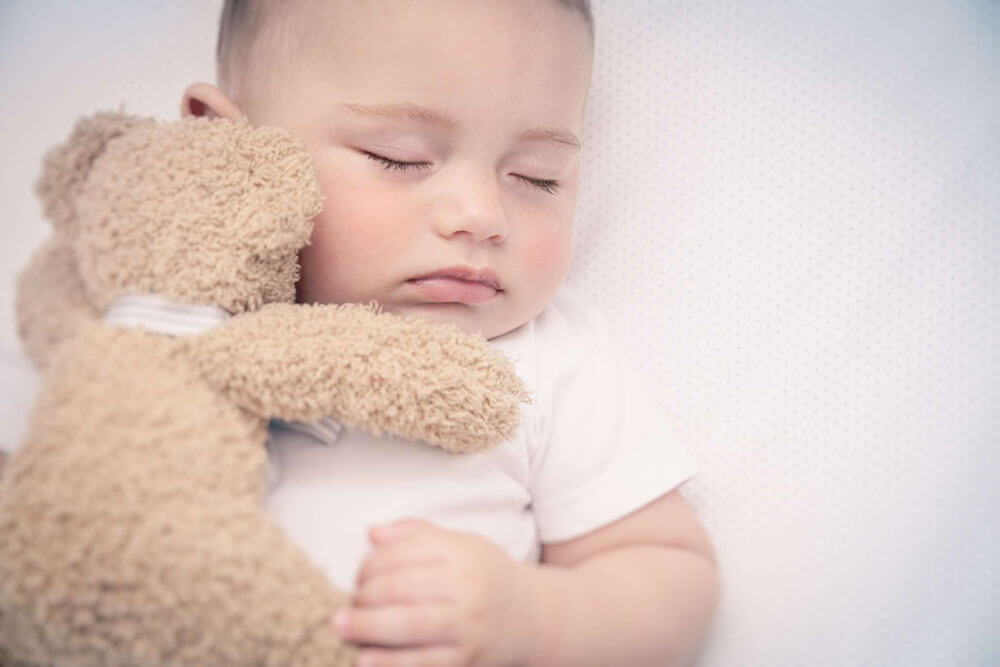
#3. Easy to Breastfeed.
It is so frustrating and exhausting to get up multiple times during the night to breastfeed the baby who sleeps in the co-sleeper crib or in another room. Moms have to get up, walk to their baby, pick them up, comfort them as they are already crying loudly by this time, feed them, put them down, and then walk back to sleep… Till the very next time 60-80 minutes later.
On the contrary, when you practice co-sleeping with newborn, you wake up when you feel the baby starts moving and you give them what they want – a good portion of breastmilk – and then fall asleep again. And you don’t even have to get out of bed! The only thing here is to make sure your baby has fallen asleep before you did.
#4. Your Baby Is Calm.
Many parents that chose to co-sleep with their infants have noticed a boost in their development and calm behavior with less crying. Placing your little one by your side, parents reduce the anxiety and fear of separation which leads to less disruptive sleep during the night and its better quality.
It is also easier for a baby co-sleeper to fall asleep with mom next to them as they feel mom’s presence, can feel her scent and are, thus, comforted much easier. Even if your baby wakes up, they won’t be stressed as they will either see, feel, or hear that you are around and get back to sleep again.
#5. Co-Sleeping Promotes Bonding.
You can’t sacrifice all the household duties and be with your baby 24/7, although you’d want to. This is especially true when the maternity/paternity leave is over and you need to be absent for around 8 hours a day. Isn’t it heartbreaking to realize you’re losing so much time and that very special bond? Safe co-sleeping is the solution here. In such a situation, it is invaluable extra time to be close to your baby even though both of you are sleeping.
#6. Develops a Deeper Sense of Trust and Love.
Moms feel that being around their children all the time helps babies to feel more loved and secure. However, not every mom can do it, and it might take some time to build that very special connection. If you feel a strong need to share a bed with your baby to bond and develop a deeper sense of love, do it without hesitation.
#7. Helps Moms to Recover from Labor Faster.
Many women suffer from postnatal depression after they’ve given birth to their children. It is either hormones playing a bad joke, or some traumatic experience during labor, or some expectations that weren’t met. The reasons are numerous.
Some studies claim that co-sleeping helps to overcome the traumatic birth-giving experience and recover faster. Certainly, it isn’t the one and only cure. If you’ve had a caesarean or any other medical interventions were made, it is easier to nurse a baby not leaving your bed as it might be very difficult to walk from one room to another and might even pull stitches and aggravate healing wounds. Just limit any physical activity, have the needed rest and keep your little one by your side or in a bedside bassinet.
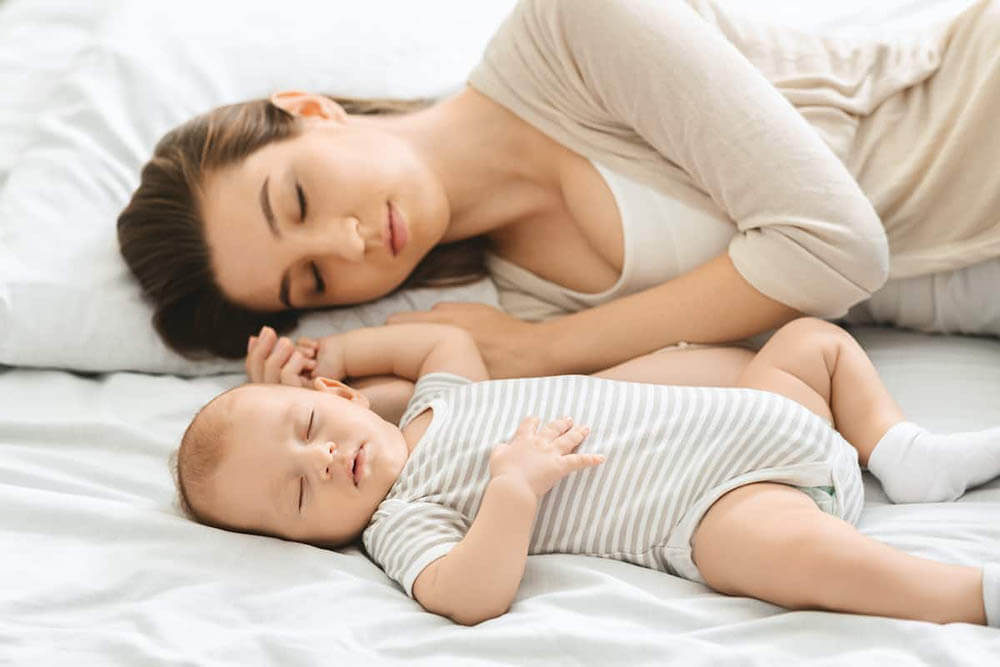
#8. Helps with Sleep Regression.
Well, this is the monster all the parents have faced. All babies have those sleep regressions or growth spurts which can be frustrating both for babies and their parents and leaves the baby crying for long minutes. Leaving your baby in hysterics is very harmful to their health, and the sleep routine of all the other family members may be disrupted.
When the baby sleeps in another room, they have to be louder to catch your attention and by the time you come to them, they will be all crying out loud. When co-sleeping, you feel your baby stirring and can eliminate the cry or at least stop it halfway.
Drawbacks of Co-Sleeping with an Infant
#1. The Risk of SIDS Is Increased.
For new parents, the scariest thing of all is SIDS, or sudden infant death syndrome, when a specific reason for a child’s death cannot be found. There are studies that have claimed the link between sharing a bed with infants and SIDS, and researchers from the National Centre for the Review and Prevention of Child Deaths in America studied around 8,000 sudden deaths of babies and concluded that 74% of those who died were co-sleeping (=bed sharing) with their parents.
#2. Parents’ Intimate Relationships Suffer.
When you are still recovering from giving birth and thoughts about sex are the last ones on your mind, over time you will come to a conclusion that having sex with a baby in the same room is not the best thing. Regular interruptions and sleep deprivation because of the baby waking up frequently during the night may become reasons for problems in a marriage. The statistics are that one-third of marriages are ruined because of sleepless nights!
#3. The Baby May Overheat.
It is important for babies to stay at a comfortable temperature while the heat from your body and the blanket can be too much. Experts recommend that moms sleep in warm clothes without a blanket so that the little one won’t get trapped under it and overheated. Also, it is important to make sure no other things like toys and additional blankets are in your bed while co-sleeping. Ensure that the sheets are pulled tightly over the mattress to avoid loosening and laying over your child, thus, making them overheated.
#4. You May Have Difficulties When Moving the Baby to the Crib.
When kids co-sleep, they will be reluctant to leave their parents’ bed and move to their new sleeping place. The reason is the baby got used to being at the mom’s all the time, snuggling and comforted, or in a co-sleeper bed beside her. To succeed with the transition, you’ll have to do it carefully and slowly to avoid distress.
Parents who have decided to “separate” their baby from them are recommended to explain their toddler what they are doing. And given their age (most co-sleep till the age of 2), they won’t have any difficulty understanding what is happening and why. You can be decorating the kid’s room together, choosing furniture and accessories and promoting the kid’s excitement about his own room and get used to the new environment.
First, you might have to sleep in their room before they get used to being away from parents, but later you will be able to put your child to bed and then leave the room before they fall asleep.
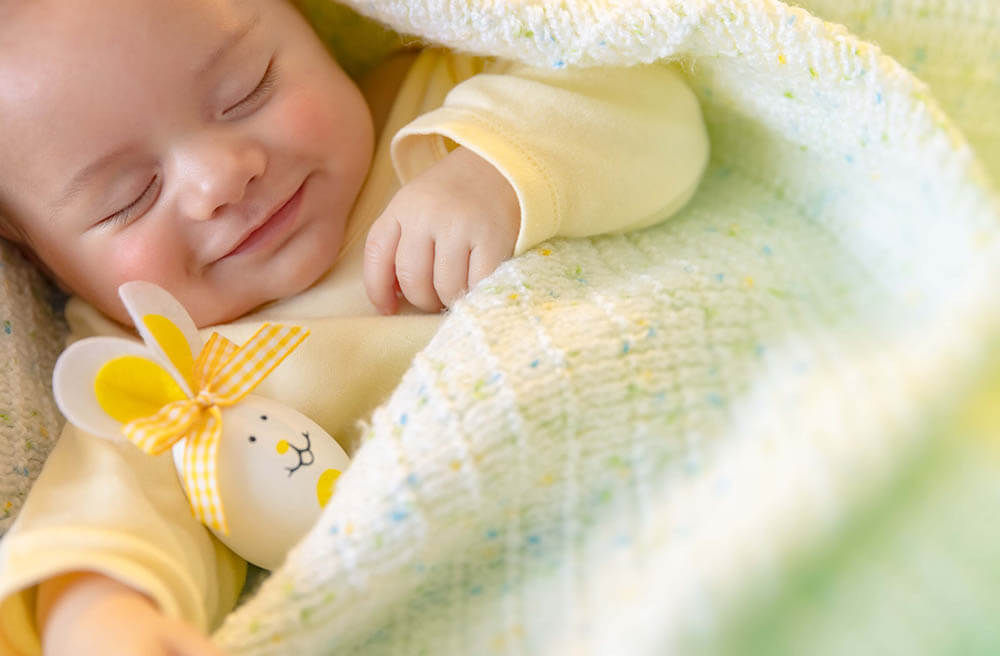
#5. Premature and Underweight Babies Are at a Greater Risk.
It is common advice for parents of preemies to avoid bed-sharing with their infants because of their low weight and an increased risk of SIDS. You can have the baby sleep in their crib in the same room or in a baby bed attached to the parents’ bed.
#6. The Kid Can Fall Out of Bed.
Though co-sleeping is comforting and generally harmless, it can be very unsafe. You kid can move during the night and fall out of bed or get stuck in a gap between the bed and the wall, for instance. The cases are numerous. If you’ve chosen bed-sharing with your little one, make sure you’ve baby-proofed your sleeping space properly or use a bedside sleeper.
Final Words
If you are still hesitating whether to co-sleep with your baby or not, we hope our guide has helped you at least to weigh all the positive and negative effects of co-sleeping and make an informed decision. Being a parent, you have to make choices and decisions all the time, and we are sure you do that right. It is you who knows what’s best for your baby, so you should do what you feel right for your family. Just ensure you follow all the baby sleep safety recommendations.
All the recommendations and tips listed here are based on the information provided by a range of highly respected institutions, among which are CDC (Centers for Disease Control and Prevention) and AAP (the American Academy of Pediatrics).
